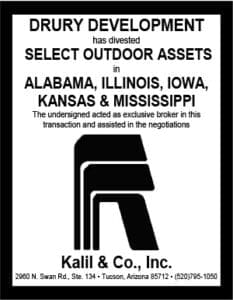 In a Billboard Insider article yesterday, GEFT Outdoor’s Jeff Lee was optimistic that he’ll win litigation against the City of Westfield even though Reagan v Austin seems has eliminated his ability to challenge Westfield’s sign code on the basis of differing treatment of on-premise versus off-premise signs. The issue has to do with whether Westfield is manipulating the code to give preference to certain forms of off-premise advertising.
In a Billboard Insider article yesterday, GEFT Outdoor’s Jeff Lee was optimistic that he’ll win litigation against the City of Westfield even though Reagan v Austin seems has eliminated his ability to challenge Westfield’s sign code on the basis of differing treatment of on-premise versus off-premise signs. The issue has to do with whether Westfield is manipulating the code to give preference to certain forms of off-premise advertising.
The City allows Westfield High School to maintain two large digital billboards on the side of its football stadium which display off-premise advertising. The Seventh District Court Court of Appeals asked the District court to revisit this: “The City itself – including its public high school – operates as a favored speaker, while GEFT suffers as a non-favored speaker subject to greater restrictions. In addition, GEFT contends that the City defeats its own alleged interests in avoiding visual clutter and promoting public safety by allowing the high school to maintain signs that others may not.”
Billboard Insider’s Take: Some municipalities restrict billboards and digital signs while permitting them on city property. We have long wondered why the courts let them do this. We agree with GEFT Outdoor’s Jeff Lee, “At the end of the day a government entity that prohibits digital off-premises speech while at the same time enjoying a government monopoly of digital off-premises speech by allowing two digital billboards on City property is as egregious of an impermissible purpose as we can imagine.”
[wpforms id=”9787″]
Paid Advertisement


















Are not most school districts Subsets of state governments just like a city? As one city cannot impose it’s laws and regulations over another city, are cities similarly unable to impose its laws over other state subsets like Unified School Districts, or maybe Transit Authorities?